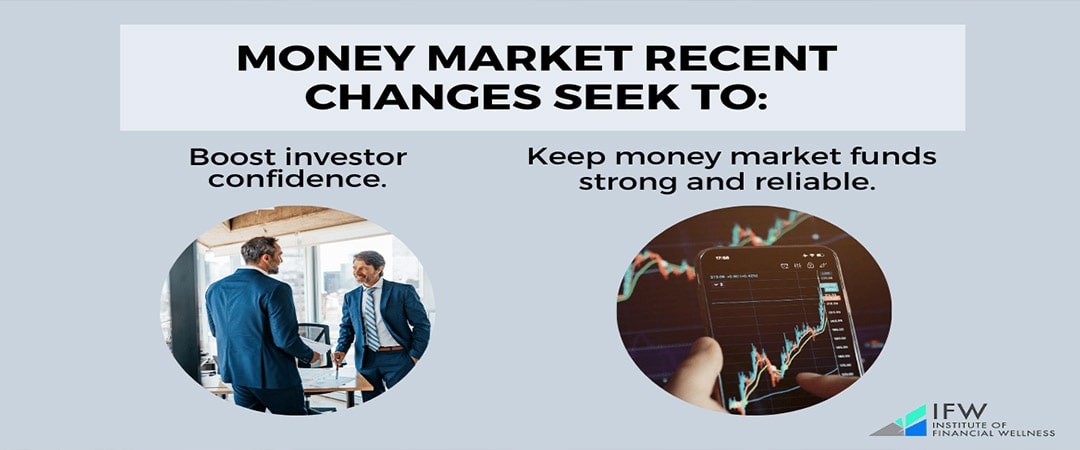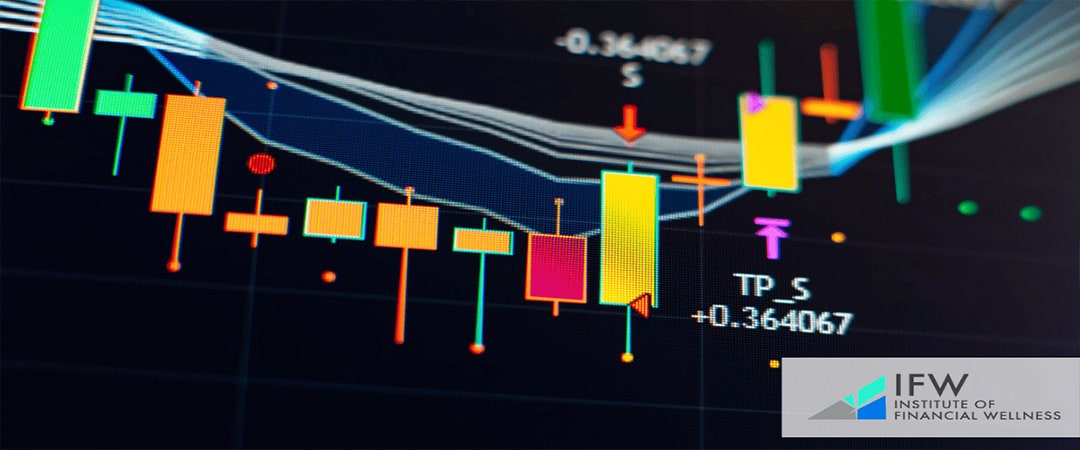“A wise person should have money in their head, but not in their heart.” -Jonathan Swift
Are money market funds safe? Will they increase my retirement score?
In most cases, yes—they’re built with low-risk, short-term debt investments for stability.
However, their safety comes with limitations, especially for long-term investments like retirement. Get ready to explore their safety features, regulatory protections, and potential risks to help you make an informed decision.
Key Takeaways
- Short-term investments. Money market funds are designed for short-term investment goals and provide stability and liquidity but lack the growth potential needed for long-term retirement investing.
- Ensure safety. Money market funds invest in low-risk, short-term debt securities and are regulated by the SEC to ensure safety and stability, but they do not have FDIC insurance, exposing investors to potential risks.
- Keep your eyes open for risks. Investors should be aware of the risks associated with money market funds, such as inflation risk and lack of FDIC protection, and consider them mainly for short-term needs rather than as a primary retirement investment strategy.
Are Money Market Funds Safe for Retirement? A Comprehensive Guide

Yes, you can boost your savings with money market funds! These are a type of mutual fund that invests in safe, short-term debt like Treasury bills and corporate paper.
They’re designed to give you slightly better returns than a regular bank account while still keeping your money accessible for immediate needs or emergencies.
Ideal for short-term investments, money market funds provide stability without the risk of significant losses. However, they aren’t great for long-term growth since their returns are usually modest.
Many people use them as a temporary place to keep their cash, enjoying better interest rates than typical savings accounts.
Understanding Money Market Funds

Money market accounts are perfect for storing money you’ll need soon, whether for emergencies, everyday expenses, or upcoming big purchases.
Designed to offer slightly higher returns than regular savings accounts, money market accounts give you a chance to earn more without taking on too much risk. They are often used in brokerage accounts to hold cash that’s ready to buy or sell other investments.
These accounts are great for short-term needs and give better interest rates compared to standard savings accounts. However, they aren’t ideal for long-term growth because their returns are modest.
If you’re looking for a safe place to park your money and earn a bit more, money market accounts are a smart choice. But if you want to build significant wealth over time, you’ll need to explore other options.
Money Market Funds: A Safe Choice for Retirement Savings

Money market funds are an excellent option for retirement savings, offering a combination of safety, liquidity, and stability, as well as mutual funds for retirement do. These funds invest in low-risk, short-term assets such as certificates of deposit (CDs for investments), and also Treasury bills (T-Bills), and commercial paper.
The primary objective is to maintain a stable share price, typically set at $1, which minimizes the risk of losing your principal investment.
As you approach retirement, preserving your capital becomes increasingly important. Money market funds excel in this area by focusing on maintaining stability and protecting your savings from market volatility.
This makes them particularly attractive for retirees or those nearing retirement who seek to safeguard their nest egg.
For those seeking even greater security, government money market funds offer an additional layer of protection. These funds exclusively invest in government-backed securities, ensuring that your assets are supported by the full faith and credit of the federal government.
This level of safety is crucial for retirees who cannot afford to take significant risks with their retirement funds.
Liquidity: Easy Access to Your Money

One of the key advantages of money market funds is their high liquidity. You can easily buy and sell shares whenever you need to access your money. This feature is especially valuable for retirees, who may require quick access to their funds to cover unexpected expenses or take advantage of new opportunities.
Assessing Safety and Risk Management

To ensure the safety of a specific money market fund, it’s important to examine the types of short-term debt instruments it invests in and how the fund managers handle risk. Look for funds with a history of prudent management and a focus on high-quality, low-risk assets.
This due diligence can give you confidence that your retirement savings are in good hands.
Risk Management Strategies

Money market funds are designed to keep their value steady, with each share aimed to stay at $1. This stability is crucial for investors seeking a safe and dependable place for their money.
To achieve this, money market funds focus on managing risk carefully.
To make sure they can handle sudden withdrawals, the SEC has set strict rules on how much cash these funds must keep on hand. If more than 5% of a fund’s total assets are withdrawn in one day, the fund must charge liquidity fees unless the costs of maintaining liquidity are minimal.
These fees help ensure the fund can still meet redemption requests without selling off too many assets quickly, which could destabilize its value.
In addition to liquidity fees, funds may also use “gates” to temporarily limit withdrawals during times of market stress. These measures—liquidity fees and gates—are tools that fund managers use to keep money market funds stable, even in tough market conditions.
These strategies help protect your money and make money market funds a secure choice for investors. If you’re looking for a safe place to invest, money market funds offer a reliable option that balances safety and accessibility.
Regulatory Protections for Money Market Funds

Money market funds, including prime money market funds, have new rules to keep your investments safe and stable. Recent changes in 2023 have added more protections and increased transparency for these funds.
One key update is that funds now have to provide more detailed information about how they will handle negative interest rates. This ensures that investors know exactly what to expect in tough financial times.
The National Credit Union Administration (NCUA) helps oversee and regulate these funds, contributing to a safer financial environment.
The new regulations also removed the option for funds to temporarily halt withdrawals, known as “gates.” Instead, they must implement liquidity fees, which are charges applied when investors pull out their money.
These fees help spread the cost of maintaining liquidity fairly among all investors rather than forcing a few to bear the brunt during stressful periods.
These changes aim to:
- Boost investor confidence.
- Keep money market funds strong and reliable.
By ensuring fair treatment and enhancing fund resilience, these reforms make money market funds a trustworthy option for your investment needs.
Comparing Money Market Funds and Money Market Accounts

Money market accounts (MMAs) and money market funds have some overlapping features, but they also possess unique qualities. Here’s what to keep in mind when evaluating whether money market accounts (MMAs) are a secure choice for your investment needs.
MMAs are typically deemed low-risk since the Federal Deposit Insurance Corporation (FDIC) insures them up to $250,000 per account holder. This offers an assurance of protection against loss in the event of a bank failure.
Additionally, many credit unions provide similar coverage through the National Credit Union Administration (NCUA), enhancing the security of these deposit accounts.
These accounts provide the convenience of debit card usage and check-writing capabilities, making it easy to withdraw money and providing flexible access to your funds. However, to circumvent fees with MMAs, you must maintain a minimum balance.
In contrast, money market funds do not impose minimum balance stipulations. Benefits of these investment products include:
- Offering variable interest rates tied directly to the performance of their underlying assets, which contrasts with the fixed-rate yields seen in most MMAs.
- Investing in safe short-term debt securities like treasury bills or commercial paper.
- Potentially offering superior earning potential compared to regular savings accounts or other traditional deposit accounts.
While MMAs shine as reliable reserves for urgent cash due to their federally insured status and easily retrievable nature, money market funds present viable avenues for higher yields, especially for institutional investors and retail investors. Understanding that MMAs and money market funds are distinct financial instruments allows you to align your choice with your individual risk tolerance and financial aspirations.
Although MMAs generally serve well for those seeking easy access to cash with insurance coverage, money market funds cater to those aiming for potentially higher returns on short-term investments. They are often used by fund managers and fund companies to manage liquidity with higher earning potential, albeit with higher risks and no insurance protection like that of FDIC-insured bank accounts.
Generally speaking, comprehending this distinction between MMAs and money market funds is crucial to knowing what selection aligns with one’s individual fiscal goals and risk appetite.
Who Should Consider Investing in Money Market Funds?

Are you thinking about investing in money market funds? See if their characteristics fit your needs.
Money market funds serve as an excellent option for:
- Investors in search of a secure location to allocate cash within their investment portfolio
- Offering both liquidity and possible tax benefits through the inclusion of municipal securities
- Individuals aiming to safeguard their short-term cash reserves with minimal risk
- Those adding balance to an aggressive growth-oriented investment strategy
Those nearing or having entered retirement, who require prompt access to portions of their capital, may find moneymarket funds appropriate. Likewise, people seeking high levels of liquidity from their investments might look towards market funds given the simplicity associated with purchasing and divesting these assets.
Such can be used as a holding vessel for imminent acquisitions, emergency savings, or readily accessible spending resources.
The Institute of Financial Wellness: Your Comprehensive Guide to Financial Mastery and Retirement Security

The Institute of Financial Wellness (IFW) stands as the premier all-encompassing multi-media outlet dedicated to financial learning, offering a wealth of resources and services. Committed to guiding individuals toward an optimal life, our mandate is focused on fostering:
- Empowerment through clear comprehension and confidence in fiscal decision-making
- Stimulating and unbiased instructional content regarding finances
- Meaningful advantages for those intent on bolstering their monetary well-being.
For pre-retirees and retirees alike, we present the IFW Retirement Roadmap—a service crafted to safeguard retirement savings against market instability and undue tax burdens, ensuring one’s financial longevity. Our weekly interactive live webinars span an array of subjects, including approaches to saving money retirement plans and delivering key knowledge alongside opportune Q&A sessions with participants.
Our Video-on-demand platform readily provides an array of educational materials focusing on finances that viewers can access anytime. This collection includes:
- Webinar recordings
- The Retirement Score Webinar
- Approaches tailored for retirement planning
Full Summary
Money market funds serve as a solid and low-risk investment choice for short-term financial goals, including emergency reserves, impending expenditures, or simply as a safe haven for your cash. These types of funds usually outperform regular savings accounts with slightly higher returns because they focus on investing in top-rated, short-term debt securities.
These funds are not the best option for long-term retirement plans due to their modest yields and inability to significantly increase in value over time.
Frequently Asked Questions
Are money market funds safe for retirement?
Market funds, designed for short-term requirements, typically offer a low-risk investment vehicle. They might not be the most suitable choice for long-term retirement goals owing to their modest yields and limited growth in value.
For planning your retirement over an extended period, it’s advisable to explore different investment alternatives beyond money market funds.
What is the total net asset value in money market funds today?
As of March 2024, the total net assets of money market funds were approximately $6.4 trillion, reflecting an 18% year-over-year increase [1].
What types of investments do money market funds hold?
Funds known as money market funds. Invest in highly-rated, short-term debt instruments including Treasury bills, commercial paper, and bankers’ acceptances, alongside certificates of deposit (CDs).
Such investments contribute to the preservation of the fund’s stability and liquidity.
How are mutual funds behaving worldwide?
The number of open-end mutual funds worldwide increased by more than 55% from 2011 to 2022 [2].
What are the potential risks associated with money market funds?
Investing in money market funds carries certain hazards, such as the peril of inflation, risks linked to changes in interest rates, credit risk implying the possibility of default by debt issuers, liquidity risk which can affect the ease with which shares can be sold and a notable absence of FDIC insurance that Protects other forms of savings.
Prior to allocating your resources into these types of market funds, it is critical to meticulously evaluate all these considerations.
How do money market funds compare to money market accounts?
Money market accounts provide easy access to money and FDIC insurance, in contrast with money market funds, which yield variable returns based on their investments but lack federal insurance.
How have mutual funds behaved in the past years in the US?
From 2000 to 2023, mutual fund investors in the United States saw a general decrease in expenses. By 2023, the average cost of investing in hybrid mutual funds had dropped to 0.58% of the invested capital [3].
Who should consider investing in money market funds?
Individuals seeking an investment opportunity with low risk and a short-term focus, as well as those aiming to broaden their growth portfolio’s diversity, might find money market funds an appealing option. These funds serve perfectly for retaining cash intended for imminent expenditures or emergency reserves, or simply as a temporary holding spot for liquidity.




